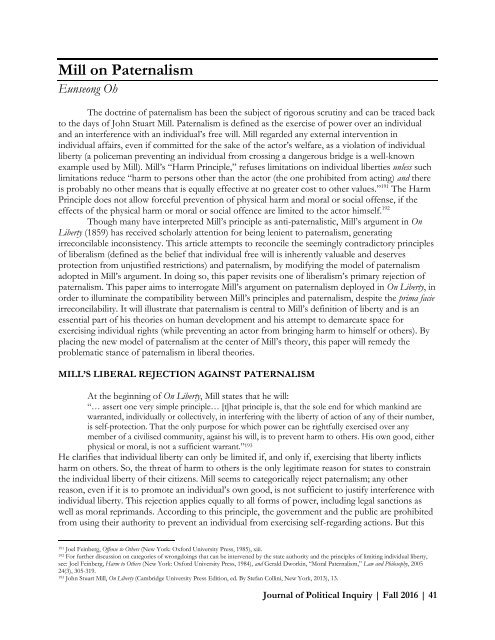Fall2016_Final2
You also want an ePaper? Increase the reach of your titles
YUMPU automatically turns print PDFs into web optimized ePapers that Google loves.
Mill on Paternalism<br />
Eunseong Oh<br />
The doctrine of paternalism has been the subject of rigorous scrutiny and can be traced back<br />
to the days of John Stuart Mill. Paternalism is defined as the exercise of power over an individual<br />
and an interference with an individual’s free will. Mill regarded any external intervention in<br />
individual affairs, even if committed for the sake of the actor’s welfare, as a violation of individual<br />
liberty (a policeman preventing an individual from crossing a dangerous bridge is a well-known<br />
example used by Mill). Mill’s “Harm Principle,” refuses limitations on individual liberties unless such<br />
limitations reduce “harm to persons other than the actor (the one prohibited from acting) and there<br />
is probably no other means that is equally effective at no greater cost to other values.” 191 The Harm<br />
Principle does not allow forceful prevention of physical harm and moral or social offense, if the<br />
effects of the physical harm or moral or social offence are limited to the actor himself. 192<br />
Though many have interpreted Mill’s principle as anti-paternalistic, Mill’s argument in On<br />
Liberty (1859) has received scholarly attention for being lenient to paternalism, generating<br />
irreconcilable inconsistency. This article attempts to reconcile the seemingly contradictory principles<br />
of liberalism (defined as the belief that individual free will is inherently valuable and deserves<br />
protection from unjustified restrictions) and paternalism, by modifying the model of paternalism<br />
adopted in Mill’s argument. In doing so, this paper revisits one of liberalism’s primary rejection of<br />
paternalism. This paper aims to interrogate Mill’s argument on paternalism deployed in On Liberty, in<br />
order to illuminate the compatibility between Mill’s principles and paternalism, despite the prima facie<br />
irreconcilability. It will illustrate that paternalism is central to Mill’s definition of liberty and is an<br />
essential part of his theories on human development and his attempt to demarcate space for<br />
exercising individual rights (while preventing an actor from bringing harm to himself or others). By<br />
placing the new model of paternalism at the center of Mill’s theory, this paper will remedy the<br />
problematic stance of paternalism in liberal theories.<br />
MILL’S LIBERAL REJECTION AGAINST PATERNALISM<br />
At the beginning of On Liberty, Mill states that he will:<br />
“… assert one very simple principle… [t]hat principle is, that the sole end for which mankind are<br />
warranted, individually or collectively, in interfering with the liberty of action of any of their number,<br />
is self-protection. That the only purpose for which power can be rightfully exercised over any<br />
member of a civilised community, against his will, is to prevent harm to others. His own good, either<br />
physical or moral, is not a sufficient warrant.” 193<br />
He clarifies that individual liberty can only be limited if, and only if, exercising that liberty inflicts<br />
harm on others. So, the threat of harm to others is the only legitimate reason for states to constrain<br />
the individual liberty of their citizens. Mill seems to categorically reject paternalism; any other<br />
reason, even if it is to promote an individual’s own good, is not sufficient to justify interference with<br />
individual liberty. This rejection applies equally to all forms of power, including legal sanctions as<br />
well as moral reprimands. According to this principle, the government and the public are prohibited<br />
from using their authority to prevent an individual from exercising self-regarding actions. But this<br />
191<br />
Joel Feinberg, Offense to Others (New York: Oxford University Press, 1985), xiii.<br />
192<br />
For further discussion on categories of wrongdoings that can be intervened by the state authority and the principles of limiting individual liberty,<br />
see: Joel Feinberg, Harm to Others (New York: Oxford University Press, 1984), and Gerald Dworkin, “Moral Paternalism,” Law and Philosophy, 2005<br />
24(3), 305-319.<br />
193<br />
John Stuart Mill, On Liberty (Cambridge University Press Edition, ed. By Stefan Collini, New York, 2013), 13.<br />
Journal of Political Inquiry | Fall 2016 | 41
















